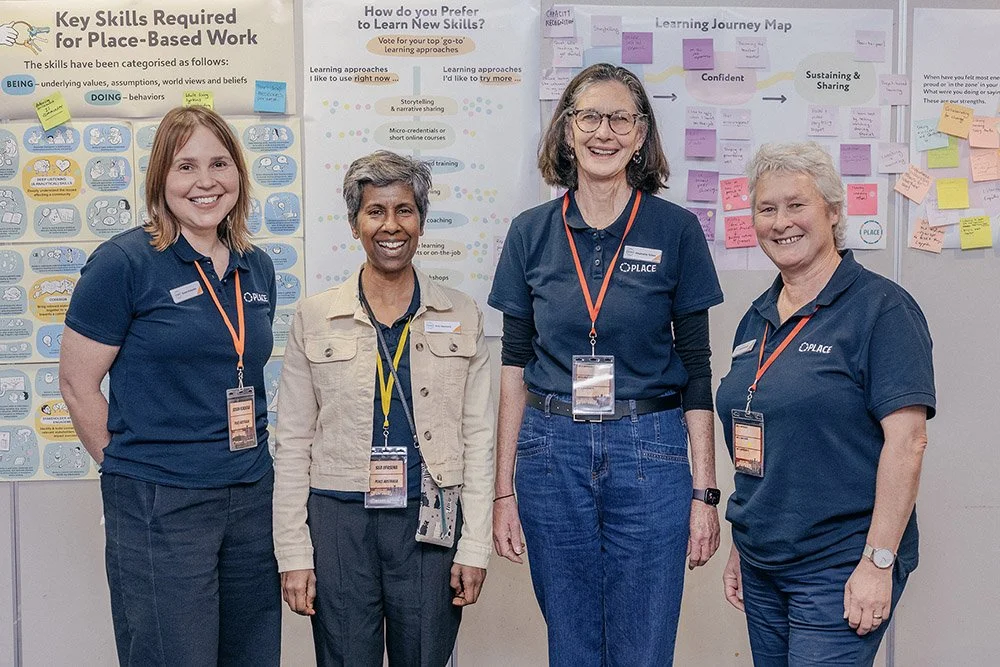Social Impact in the Regions (SIITR), 2–5 September 2025
Last week, PLACE Australia attended the Social Impact in the Regions (SIITR) conference in beautiful Grafton, NSW, from 2–5 September 2025. Over 200 delegates attended from across Australia, spanning First Nations representatives, practitioners, service providers, philanthropists, academics, and community leaders.
SIITR underpins the work of Ready Communities. This is the third in a series of conferences held in the regions to explore practical solutions for systemic change in the regions. The 2025 program, unfolded across three themed days:
Day 1: Come as you are – Focused on readiness through the five Readiness Indicators: Clarity, Capacity, Connection, Collaboration, and Advocacy.
Day 2: As you were – Turned attention to wellbeing in regional communities from personal, cultural, financial, and systemic perspectives.
Day 3: As you want to be – Channelled insight into action, helping participants shape practical plans and connections.
Key Skills for Place-Based Work
On Day 2 of the conference, PLACE facilitated an interactive workshop exploring the key skills required for effective place-based work. Designed to be hands-on and engaging, the session invited participants to rotate through four activity stations that encouraged voting, posting, and discussion. This format created space for diverse perspectives to surface and for participants to reflect on the capabilities most critical to strengthening place-based practice.
-
Facilitated by Enable’s Suji Upasena and Stepanie Tchan, these stations focused on the 6 key skills identified by the Enable team through research and analysis of place-based frameworks:
Leadership – Building and sustaining momentum
Deep Listening & Analytical Skills – Gaining genuine understanding of community issues
Stakeholder Analysis & Engagement – Mapping and connecting with relevant players
Co-design – Collaboratively shaping a shared vision
Project & Program Management – Delivering meaningful, tangible outcomes
Use of Data & Evidence – Grounding decisions in research, insights, and community voice.
There were insightful reflections on the interconnected nature of place-based work. One participant noted that “whole living systems understanding is an uber skill and mindset”, while another practitioner highlighted that, in some contexts, “the authorising environment is the community.” Another noted that “fostering wellbeing underpins all the skills”.
Attendees from philanthropy emphasised the importance of “including funders within the authorising environment,” a view that came through strongly in the workshop discussions. Another contribution was from a practitioner who shared plans to use the key skills framework for their team’s self-reflection to identify strengths and gaps. Deep Listening was the top ranked skill followed by Leadership, Stakeholder Engagement, Data & Evidence, and Project Management respectively.
-
This interactive station invited participants to reflect on their personal and professional learning journeys in the context of skills development. Participants explored not only how they currently approach learning but also the formats, styles, and environments they aim to integrate into their future learning and skills development.
The session highlighted the diversity of learning preferences in place-based work ranging from structured, formal training, to experiential learning, mentoring, or peer-to-peer exchanges. What emerged clearly was the importance of flexibility and choice in learning pathways that meet people ‘where they are at,’ and the need for learning and training resources that are not only accessible but also grounded in real-world application. These discussions served as a reminder that learning and skills development is not one-size-fits-all in place-based work. It must recognise extensive existing capabilities and be inclusive, context-specific, and designed to empower practitioners to grow in ways that resonate with their values, roles, and aspirations.
-
The final station prompted participants to reflect on their own strengths, and those of their communities. People considered their strengths in the context of when they felt energised and proud, what built their strengths and what the strengths enabled them to do in their communities.
The group identified strengths that centre on listening, empathy, and connection, built through lived experience, resilience, and diverse community involvement. These capacities enable them to amplify voices, foster collaboration, and turn vision into action - creating inclusive spaces, building trust, and driving collective momentum for change.
Attendees received resources to take away for deeper reflection about the strengths within themselves and their community. People reflected that they often consider the strengths in their own community, but don't feel comfortable thinking about their own strengths.
Our Key Takeaways & Reflections
The team were energised by the innovation and resilience of young people, and their ability to build social enterprises and initiatives that respond directly to community needs. The event highlighted a key challenge facing regional communities, particularly in supporting positive mental health and access to support services. Workshop discussions reinforced the vital role of community-led initiatives, and the critical need of embedding sustainable funding within workforce planning. The team left Grafton with a firm commitment to action to amplify place-based efforts, and to ensure diverse voices help shape a national workforce strategy.
SIITR was a thought-provoking experience that reinforced PLACE’s commitment to supporting place-based approaches, strengthening skills and capacity, and amplifying community voices across Australia. We’re grateful to everyone who engaged with the Enable workshop and shared their insights. We’re looking forward to continuing the conversation.
Images by Peter Sechi. (Top image banner from left to right: Susan Kukucka, Suji Upasena, Stephanie Tchan, and Jane Anderson)








